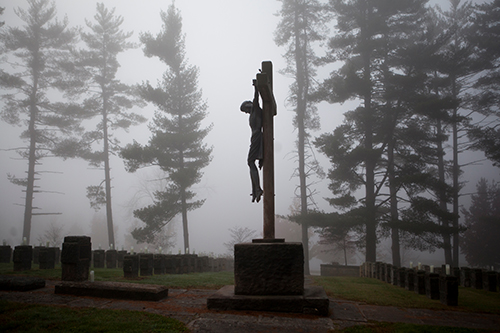A Continuous Lent
Fr. Adrian Burke, OSB
Thursday, February 18, 2021

So important was Lent to Benedict's monastic outlook that, in his view, the entirety of the monastic life "ought to be a continuous Lent." (RB 49.1) Lent is also the only liturgical season to which he dedicates an entire chapter (RB 49).
Benedict is always aware of the "incarnational" (embodied) aspect of spiritual life by striking a tone of moderation throughout his Rule. Even when writing about Lent, which most people today and certainly back in his day thought of as a rigorous time of self-denial, he remains moderate. In the verse that follows the one quoted above, he comments that few have the strength for observing Lent perpetually (cf. 49.2). He knows we're human - not God, and not angels.
But even more than the short chapter on Lent itself, for me, no chapter of the Rule resonates more with Lent than the lengthiest chapter, the one entitled On Humility. I'd like to reflect on that chapter to illustrate something of the monastic spirituality, for which the virtue of humility is central, and as a way for us to steep minds and hearts in a Lenten spirit.
In Chapter 7, on humility, St. Benedict provides a kind of summary of the whole of his spiritual teaching as presented in the prologue and first six chapters. By way of doing this, he incorporates a metaphor, a symbolic image that helps us to see that the disciplines he urges us to practice lead us on an upward journey to God.
The image is a ladder with 12 rungs or steps. Each step has a focus and provides a framework for practicing some dimension of humility that, even if it feels like a descent from the heights of the ego-centered self is, at the same time, an ascent of our "true," Christ-centered, selves to God.
Humility is not about self-effacement as much as it is about seeking to realize one's true self as rooted in Christ and as radically dependent on God's grace. The steps of the ladder, which will guide us to a greater realization of humility, are really nurturing in us, at a deep level, the Self-in-Christ. I call this Self (with a capital "S") our true self because it's who God intended you to be from the beginning. This Self is always who you are, and is the ground and foundation of your conscious, work-a-day self, the "self" others relate to and see at the surface.
But your true Self-in-Christ remains less than fully realized at the level of waking consciousness. Sin, selfish tendencies and behaviors, which spring from our fears, anxieties, and insecurities, and our attachment to things, behaviors, and even attitudes and opinions, all inhibit the "flow" of grace.
They inhibit our receptivity to God's assistance in actualizing, or realizing (making real and concrete), the true Self at the level of our ordinary daily existence. The more connected we are to that ground that is our true Self-in-Christ, the more "true" we are at the surface, the more authentic we are as we relate to others. The steps of the Ladder of Humility are exercises that connect us to that depth of authenticity.
The first step in the Ladder of Humility is so fundamental to what follows that without exercising this discipline we can't ascend the ladder further. That first step is to keep the "Fear of God" always before our eyes. This amounts to striving to increase our awareness of God's continuous presence among us, within us and around us.
We can practice this step by taking a few moments of quiet "rest," a mini-Sabbath. This can be done even at your work station - no one need know what you're up to. Stop what you're doing, close your eyes, and allow your mind to focus on nothing but your breathing. You may notice how shallow it is, so take some slow deep breaths, and as you exhale feel the stress flow out of you; relax your shoulders and neck. In that stillness, interiorly acknowledge God as present: "God, I know you are always here guiding me and sustaining me. Bless all I do today, that all I do can be for your glory!"
It takes less than five minutes and then you can return your attention to your task! It's a simple way to "work" the first step of the Ladder of Humility. Over time, this can become a habit, something that can be a source of peace when things get stressful, or a time of gratitude when things are going well. Try to do this a few times each day, and over time you will deepen your awareness of the ever-present reality of God.